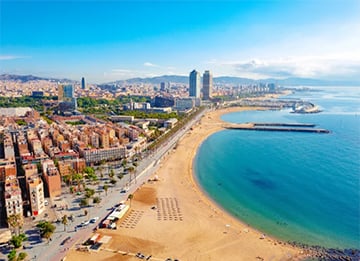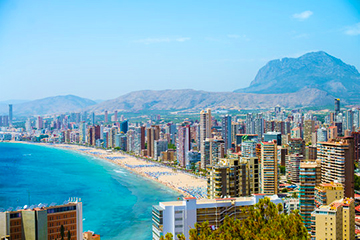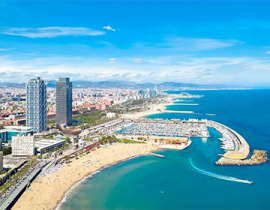- Home
- Blog
- Tips & Advice
- Selling Property in Spain: Tips and Legal Requirements
Selling Property in Spain: Tips and Legal Requirements
Plann ing to sell your property in Spain? Here is a detailed explanation of how to sell, things to consider, and tips for fast sales. Selling property in Spain involves specific legal requirements; understanding these rules is essential. Working with an international real estate agency like TEKCE helps you navigate every step confidently. To give you a clear picture of the process, we have prepared a designated SELL page to help you understand how to sell a property in Spain smoothly. TEKCE Real Estate is your trusted and professional partner, operating in top Spanish cities, including Alicante, Almería, Barcelona, Cádiz, Girona, Granada, Madrid, Málaga, Marbella, and Murcia. With the expertise of our dedicated teams in Málaga, Alicante, and Barcelona offices, we ensure an efficient property-selling experience. From property valuation to closing the deal, our professionals guide you every step of the way, providing a fast, transparent, and stress-free process.
ing to sell your property in Spain? Here is a detailed explanation of how to sell, things to consider, and tips for fast sales. Selling property in Spain involves specific legal requirements; understanding these rules is essential. Working with an international real estate agency like TEKCE helps you navigate every step confidently. To give you a clear picture of the process, we have prepared a designated SELL page to help you understand how to sell a property in Spain smoothly. TEKCE Real Estate is your trusted and professional partner, operating in top Spanish cities, including Alicante, Almería, Barcelona, Cádiz, Girona, Granada, Madrid, Málaga, Marbella, and Murcia. With the expertise of our dedicated teams in Málaga, Alicante, and Barcelona offices, we ensure an efficient property-selling experience. From property valuation to closing the deal, our professionals guide you every step of the way, providing a fast, transparent, and stress-free process.
Checklist: Steps to Sell Your Property in Spain
- Find an Estate Agent
- Appoint a Solicitor (Lawyer)
- Advertise the Property
- Negotiate and Accept an Offer
- Gather Required Documentation
- Sign the Contract of Sale (Contrato de Compraventa)
- Final Signing at the Notary (Escritura de Compraventa)
- Register the Sale
1. Find an Estate Agent:
Once you decide on the property you want to put on sale, preparing the Spanish home for the potential buyers will be a professional and nice move to attract the attention of buyers. Also, working with a professional real estate specialist will help to ensure a smooth journey in terms of finding the correct value of the property, preparing required documents and registering the sale at the final step, or even to prevent problems that might occur after the sale.
Thus, it can be said there are numerous benefits of selling your property with a real estate company, especially for non-residents, to handle legal checks, avoid scams, manage taxes, and assist with contracts and communication with authorities. Additionally, some real estate companies like TEKCE, provide access to legal consultancy to ensure all legal procedures are properly handled.
2. Appoint a Solicitor (Lawyer):
Since Spanish property laws and regulations can be complex and vary by region, appointing a solicitor (lawyer) when selling property in Spain is highly advisable in order to have a legally smooth transaction. The lawyer you will work with can protect your interests, facilitate the complex administrative and tax processes, and provide invaluable peace of mind, especially for if you are selling property in Spain as a non-resident.
3. Advertise the Property:
The next step after choosing a reliable real estate agent is to advertise the property in order to make sure the property is effectively marketed. This step includes creating an engaging listing about the key features of your home, taking high quality photos and videos for the potential buyers to evaluate and later on publishing them on popular portals, social media and the website of your real estate company. If the aim is to sell your property fast in Spain, it should be noted that detailed photos of a well-cleaned house will increase the visibility of your advertisement and attract more buyers, especially, on social media platforms since the World is in a digital era nowadays.
4. Negotiate and Accept an Offer:
Once you receive an offer, it’s your opportunity to negotiate and ensure everything aligns with your needs. This is where advice on selling property in Spain can really help you, especially if you’re unsure about pricing or contract details. Take the time to discuss terms with the buyer and when you’re both comfortable, you can accept the offer and move forward.
5. Gather Required Documentation:
In the process to sell a house in Spain, having all the correct and complete documentation ready is crucial. It not only helps you to avoid delays but also helps the transaction run smoothly. To answer the question “What documents are essential for selling a property in Spain?” in your mind, here’s a breakdown of the essential documents you’ll typically need when selling property in Spain:
- Property Title Deed (Escritura Pública): The official proof of ownership including details like boundaries and property rights.
- Nota Simple from the Land Registry: You can think of this document as a snapshot of your property. It confirms whether there are any debts or mortgages, and how the land is classified. Spanish homebuyers and notaries usually ask for Nota Simple in the process.
- Energy Performance Certificate: Showing how energy-efficient your home is, this certificate has been mandatory since 2013 and must be shared with the buyer before the final signing.
- Certificate of Habitation: This certificate proves your home is livable and up to local standards. It’s especially important if your house is newly built or recently renovated.
- IBI Tax Receipt: You’ll need to show that your local property taxes are paid up to date. It reassures buyers that there are no hidden debts tied to the house.
- Community of Owners Certificate: If your property is part of a complex or apartment block, you’ll need a certificate confirming that all community fees are paid. It keeps things transparent and avoids complications later.
- Recent Utility Bills: It is better for you to bring copies of your latest water, electricity, or gas bills to show everything is paid and no debts will pass on to the new owner.
- Mortgage Cancellation Certificate: If you had a mortgage and it’s been fully paid, you’ll need a certificate or deed showing it’s officially canceled. This clears the title for the buyer.
- Technical Inspection Certificate (ITE): Varying by region, for older homes (usually over than 45 years), you may need a certificate confirming the building is safe and up to code.
- Your ID and NIE Number: Lastly, if you’re a non-resident, you will need your passport or national ID and your NIE number.
Having all these documents prepared before starting the selling a house in Spain process gives a professional impression to the buyer and helps you save time. After that, you’ll need to proceed to the notary, where they will verify the documents if everything is in order.
6. Sign the Contract of Sale (Contrato de Compraventa):
At this stage, you’ll officially agree to sell your property by signing the Contrato de Compraventa, the contract outlining the terms of the sale, including the agreed price and the responsibilities of both parties with the buyer. Since it’s a big step, it is better to make sure to read everything carefully before signing the contract.
7. Final Signing at the Notary (Escritura de Compraventa):
This is the final step before the sale is complete. Both you and the buyer will meet at the notary to sign the Escritura de Compraventa, which officially transfers ownership of the property. The notary will verify all the documents, and once everything is confirmed, you’ll sign the deed, making the sale official.
8. Register the Sale:
After everything’s signed and sealed at the notary, the last step is to register the sale with the Land Registry. This step officially makes the buyer the new owner of the property. It’s a simple, yet, crucial process that ensures the transfer is legally recognized, so both you and the buyer can feel confident everything is in place.
Costs and Taxes When Selling Property in Spain
When you’re selling property, it’s essential to be aware and prepared for the costs of selling a home in Spain that will affect your final profit. You’ll typically pay real estate agent fees (3%–6%) and legal fees (1%–2%) for contract assistance and legal advice. It includes capital gains tax (19% on the profit), and if you're a non-resident, the buyer will withhold 3% of the sale price as an advance, which you can reconcile later.
Also, if you have questions like “What are the typical costs involved in selling a property in Spain?” it is better to keep in mind that you will need to account for the Plusvalía tax, based on the increase in land value, and mortgage cancellation fees (0.5%–1%) if applicable. Notary and land registry fees (0.1%–0.5%) are also part of the process, along with the cost of an energy performance certificate (usually costs between 100–500 Euros).
The Advantages of Selling Property in Spain
Sellin g your home in Spain offers a solid market and various financial benefits, making it a great choice if you’re thinking of moving on from your property. Below are key advantages of selling property in Spain:
g your home in Spain offers a solid market and various financial benefits, making it a great choice if you’re thinking of moving on from your property. Below are key advantages of selling property in Spain:
- High Demand: Spain is a popular destination, especially in coastal areas and major cities, so there’s a good chance your property will attract buyers quickly.
- Tax Benefits: If you’re a resident, you could qualify for tax reductions or exemptions on capital gains, especially if it’s your primary residence.
- Favorable Currency Exchange: If you’re selling from a country with a stronger currency, you may get a better deal when transferring the funds back home.
- Legal Protection: The Spanish legal system ensures the process is secure, so you don’t have to worry about hidden risks.
- Buyer Financing: Spain offers competitive mortgage rates, making it easier for buyers to finance their purchase, which can speed up your sale.
What to Expect After the Sale?
Now that we have highlighted what to consider when selling a property in Spain, it is time to see what it is like after selling your home. When the sale is legally complete after signing at the notary and registration, you must settle all taxes and notify relevant parties to avoid future liabilities and make sure that there were no mistakes in the process that might occur in the future. That’s why searching for top real estate services in Spain in order to enlighten you about how to sell a property in Spain to ensure a seamless process is an important step to take.
Why TEKCE is the Right Choice for English Speakers
We speak 33 languages at our offices. If you are a foreigner, it will be more easy to communicate with our agency. You may visit this page, “Why you should work with TEKCE?”. If you are an English or American, TEKCE is even more convenient to be your selling partner. If you have a property in one of these service areas, please contact TEKCE Real Estate:
Alfaz del Pi, Algorfa, Altea, Benidorm, Benijófar, Benissa, Benitachell, Biar, Bigastro, Busot, Calpe, Cox, Dénia, Dolores, El Campello, El Verger, Elche, Finestrat, Guardamar del Segura, Hondón de las Nieves, Jávea, La Nucia, Los Montesinos, Monforte del Cid, Mutxamel, Orihuela, Pilar de la Horadada, Polop, Rojales, San Fulgencio, San Miguel de Salinas, Santa Pola, Teulada, Torrevieja, Villajoyosa, Cuevas del Almanzora, Pulpí, Badalona, Hospitalet de Llobregat, L'eixample, Moncada i Reixac, Premià de Dalt, Sabadell, Sant Andreu de Llavaneres, Sant Marti, Sarria-Sant Gervasi, Teià, Terrassa, San Roque, Begur, Tossa de Mar, Almuñécar, Torrelodones, Algarrobo, Alhaurín el Grande, Benahavís, Benalmádena, Casares, Estepona, Fuengirola, Istán, Manilva, Marbella, Mijas, Nerja, Ojén, Rincón de la Victoria, Torremolinos, Torrox, Vélez-Málaga, Águilas, Alhama de Murcia, Avileses, Calasparra, Cartagena, Fuente Alamo, Los Alcázares, San Javier, San Pedro del Pinatar, Torre-Pacheco, Yecla, Cambrils.
Frequently Asked Questions About Selling Property in Spain
How long does selling my house in Spain usually take?Selling your house in Spain typically takes between 3 and 6 months on average, though this varies significantly depending on location, property type, pricing, and market conditions.
What is the total cost of selling property in Spain?Although the exact percentage depends on the property type, location, and whether you’re a resident or non-resident seller, selling a property in Spain costs range between 5% and 15% of the final sale price including real estate agent fees, capital gains tax, legal fees, notary costs, and mortgage cancellation fees if applicable.
How does the process of selling a property in Spain differ for residents and non-residents?The process of selling a property in Spain is straightforward for both residents and non-residents, with just a few differences. Non-residents have some added steps, like the 3% withholding tax and potentially needing a fiscal representative, but these are manageable and help ensure the process runs smoothly. Overall, both groups can navigate the sale efficiently with the right preparation.








